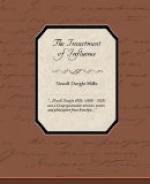Ruskin interprets it through a nation that allowed her noblest to descend into the grave, garlanding the tombstone when they refused to crown the brow; paying honors to ashes that were denied to spirit; wreathing immortelles only when they had no use save for laying on a grave where was one dead of a broken heart through a nation’s ingratitude. Above all, Jesus Christ interprets it at midnight in Gethsemane, when he saw the torches fluttering in the darkness, heard the clanking of sabers and soldiers’ armor, and in sad, reproachful irony wakened his disciples with these words: “Sleep on, now; sleep forever if you will! Henceforth no stress of your vigilance can help me; no negligence of your duty can harm me beyond the harm you have already wrought. Take your ease now. Sleep; the opportunity has gone.” Then was the disciples’ joy turned into mourning, and for garments of praise did they put on ashes and sackcloth. An irreparable loss was theirs. Yet for all of us each neglected duty means a tragedy. It is always now or never. The treasure wrapped up in each strategic opportunity is of infinite value. To-morrow can hold no joy when yesterday holds this memory: “While I was busy here and there my opportunity was gone.”
How strategic the period of youth! Then the chiefest forces of life flow together in sensitive conjunction. Then four great gifts like four great rivers unite in one majestic current to bear up the young man’s enterprises, and sweep him on to fame and fortune. Opportune are all the days when health spills over at the eye and ear and laughs through the lips. Men worn out are like overshot wheels—the life trickles and the buckets are filled slowly by long rests and frequent vacations. Young men are like undershot wheels—always, by day and night, the water overflows the banks.
Each morning the young soul wakens to the supreme luxury of living. The world is a great beaker brimmed with wine of the gods. The truth and beauty of field and forest and river give a pleasure that is exquisite to a keenly sensitive and perfectly healthy youth. Like an Aeolian harp, the slightest breath avails for wakening melody midst its strings. But years multiply cares. Age increases heaviness. Time destroys its own children. The poet says: “In youth we carry the world like Atlas; in maturity we stoop and bend beneath it; in age it crushes us to the ground.” For the overtaxed and invalided, the dew-drops do not sparkle as diamonds; the wet grass suggests red flannels and cough sirups. For the nervous the bird’s song is a meaningless chatter. For the sickly the clouds are big black water-bottles, though time was when they were chariots for God’s angels, curtains for hiding ministering spirits trooping homeward at night, leaving all the air sweetly perfumed. It is the body that grants the soul permission to be happy.




